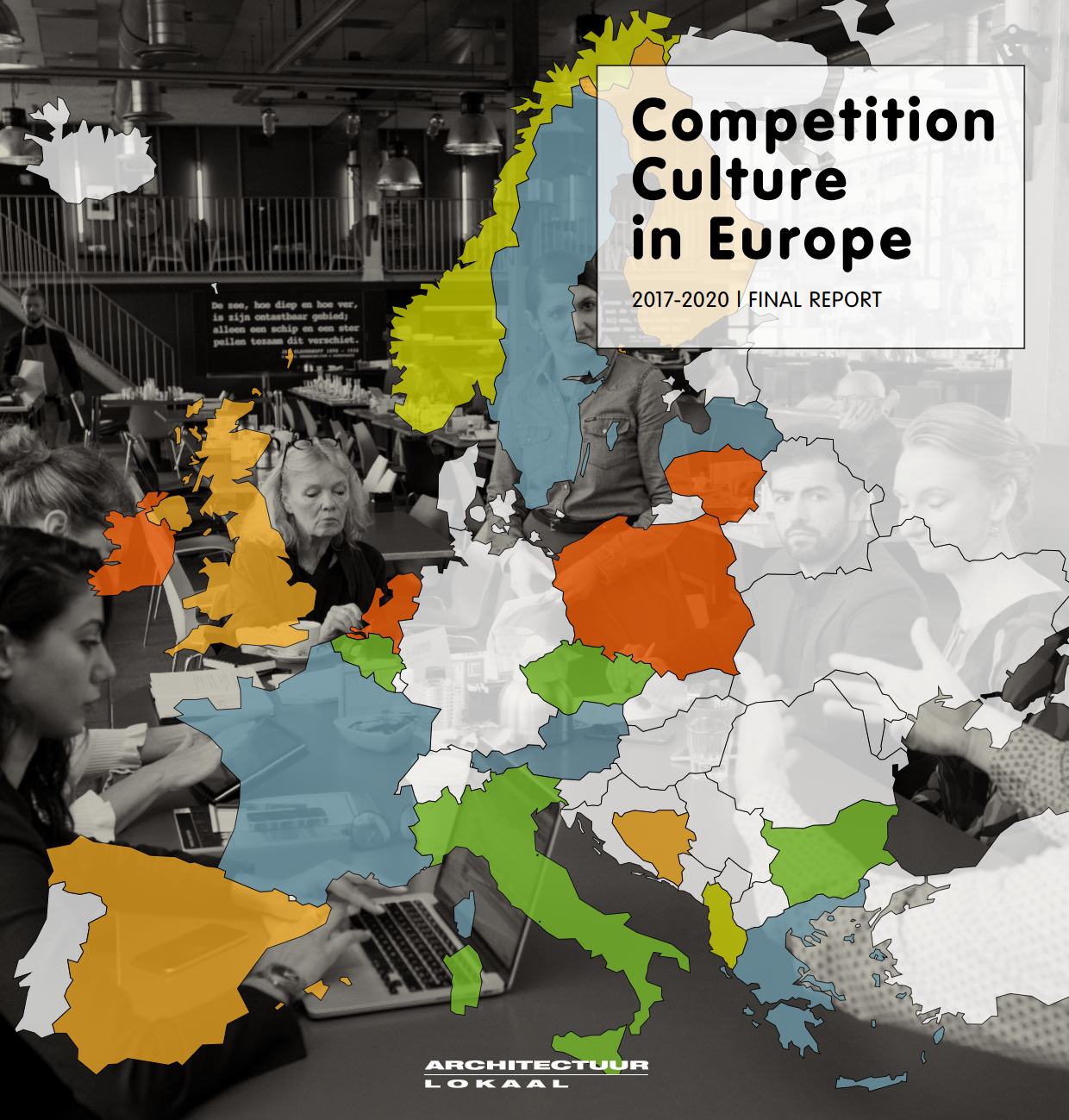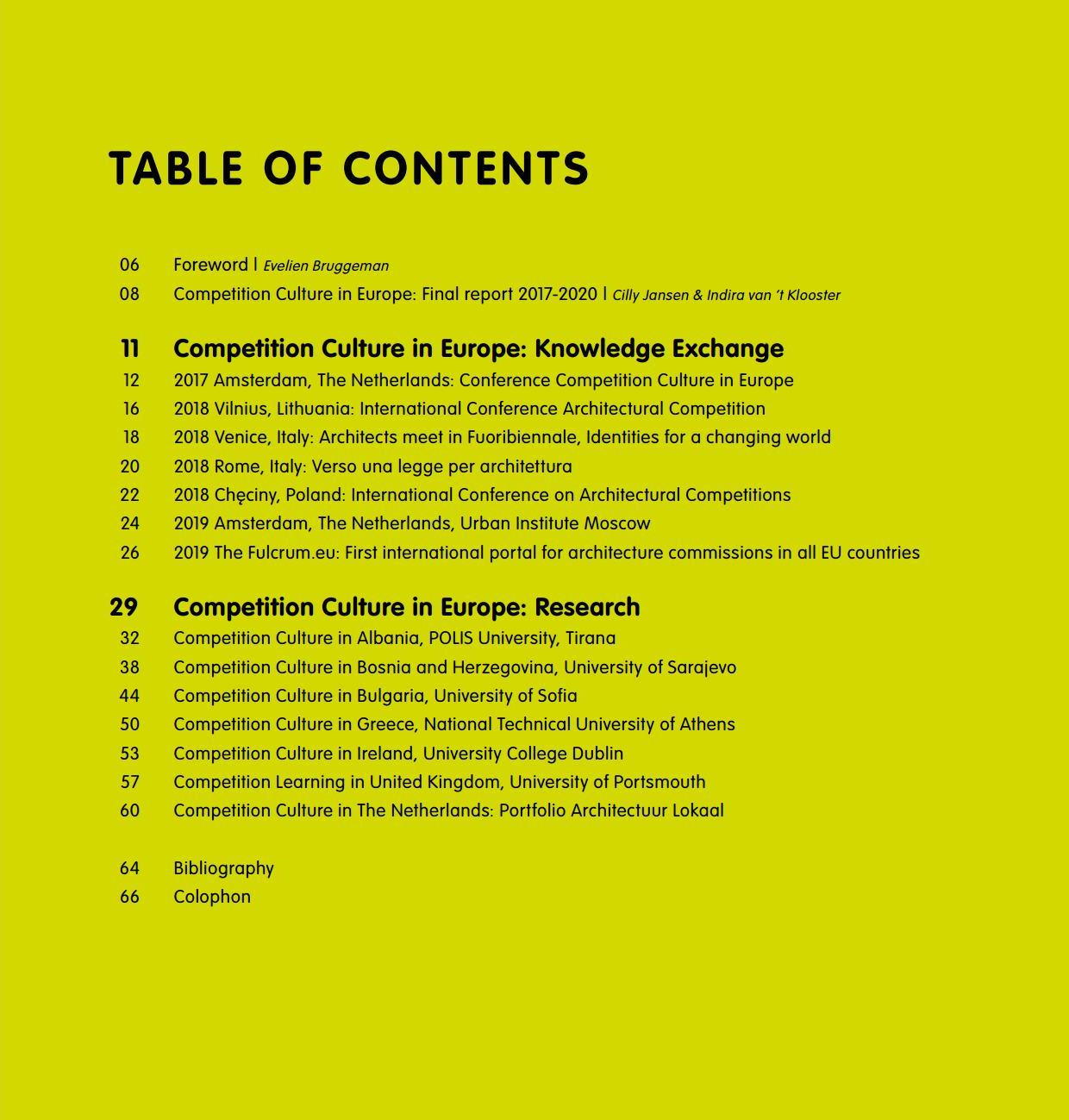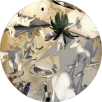|
|
Competition Culture in Europe 2017–2020 : Final Report. — Amsterdam, 2021  Competition Culture in Europe 2017–2020 : Final Report / Saimir Kristo, Elša Turkušić Jurić, Aneta Vasileva, Olga Ioannou, Emmett Scanlon, Cilly Jansen, Indira van ‘t Klooster, Walter Menteth. — Amsterdam : Architectuur Lokaal, 2021. — 66 p., il. — ISBN 978-94-91429-10-1TABLE OF CONTENTS
06 Foreword I Evelien Bruggeman
08 Competition Culture in Europe: Final report 2017-2020 I Cilly Jansen & Indira van 't Klooster
11 Competition Culture in Europe: Knowledge Exchange
12 2017 Amsterdam, The Netherlands: Conference Competition Culture in Europe
16 2018 Vilnius, Lithuania: International Conference Architectural Competition
18 2018 Venice, Italy: Architects meet in Fuoribiennale, Identities for a changing world
20 2018 Rome, Italy: Verso una legge per architettura
22 2018 Chęciny, Poland: International Conference on Architectural Competitions
24 2019 Amsterdam, The Netherlands, Urban Institute Moscow
26 2019 The Fulcrum.eu: First international portal for architecture commissions in all EU countries
29 Competition Culture in Europe: Research
32 Competition Culture in Albania, POLIS University, Tirana
38 Competition Culture in Bosnia and Herzegovina, University of Sarajevo
44 Competition Culture in Bulgaria, University of Sofia
50 Competition Culture in Greece, National Technical University of Athens
53 Competition Culture in Ireland, University College Dublin
57 Competition Learning in United Kingdom, University of Portsmouth
60 Competition Culture in The Netherlands: Portfolio Architectuur Lokaal
64 Bibliography
66 Colophon
FOREWORD
This publication shows a large number of activities, research and education projects on the subject of competition culture in Europe, carried out as part of the four year project: Competition Culture in Europe 2017-2020.
In my opinion, this rather concise booklet does not do justice to the impact of the project and the work done by all people involved. Reading it, made me realise how much has been achieved in four years' time. We can only imagine what its impact will be in the upcoming years and decades.
Overall the program's goal was to increase the quality of commissioning in order to contribute to the development of European building culture. Trying to establish a European Building culture is quite the task. This project started with contributing to its development by sharing knowledge and experiences between European countries. It has and still is truly improving the accessibility and transparency of design competitions in Europe and will stimulate cross-border commissioning as well as improvement of competition culture on both a European as well as a national level.
As an educator, I am especially taken by the large number of students, our future professionals in the field, who participated in this project. Educating young people about architectural competitions and its dynamics throughout Europe, is essential for developing a better understanding on the differences between countries. Equal chances and abiding to the principles of non-discrimination, form the basis of the European Procurement Directive.
The importance of teaching students and professionals on both the law laid down in the directives and its implementation into national acts, but more importantly on competition culture in different countries, cannot be underestimated. It contributes to achieving both the goal of the Procurement Directive in achieving a fair and transparent and single European market, as well as a European building culture. Immersing young people in knowledge on public commissions and competition culture in different countries, is a future proof approach which will make sure the impact of this project will last for decades.
As a lawyer, I'm delighted by the large number of activities, projects and outcomes which cover the subject of the law in conjunction with cultural specifics. I have stated many times that the law never operates in a vacuum, but is part of society and culture and the people living and working in it. Although The EU member States all have to implement and comply with the European procurement Directive, due to historical and cultural difference, not all national procurement acts are implemented or interpreted in the same way. Different interpretations of seemingly neutral terms is a fascinating subject for lawyers. However, in practice different applications and interpretations can lead to misunderstandings, disputes and inequality. It therefore will be counterproductive to the central aim of European legislation, namely a uniform approach and set of rules for and in all members states.
I remember one of my former professors stating that it is not the lack of a uniform (system of) law which prevents us from interacting or doing business with or in other countries. It is the lack of knowledge of the law, the differences in language (and lack of knowledge of those languages) and the lack of knowledge of different cultures, rather than boundaries, laws and actual distance, that keeps us apart as Europeans.
A telling example is to be found in the tenders and competitions in European countries, whether or not they are members of the European Union. I'm therefore especially delighted about the initiatives as part of this project focussed on increasing understanding of different cultures and legal systems and terms and languages, like the development of the EU Competition Culture Dictionary and the website TheFulcrum.eu. The website especially is worth mentioning for all people working in this field. It is established in 2019 and is the first international portal for architectural assignments in all European countries. In my opinion this is the best way to break borders between countries; European legislation can be consulted in each country's own language and the national tendering and competition portals can be consulted per country, as well as relevant publications, and organisations dealing with the tenders and competitions in that country.
But reading this publication will give insight into a large number of other interesting researches, activities and tangible results from a project that only lasted four years, but will have a much longer impact. I congratulate everybody involved in Competition Culture in Europe 2017-2020: the results are truly something to be proud of.
Prof. Dr. Evelien Bruggeman
General Secretary of the European Society of Construction Law, director at the Dutch Institute for Construction Law and professor of Construction Law at the Delft University of Technology (NL)
COMPETITION CULTURE IN EUROPE: FINAL REPORT 2017-2020
Cilly Jansen & Indira van 't Klooster
Competition Culture in Europe 2017-2020 is a four-year project geared towards improving the accessibility and transparency of design competitions in Europe. With this project, Architectuur Lokaal (NL) initiated a structured European network to contribute to improving the quality and accessibility of design competitions, promote interdisciplinary collaboration and international design research and revitalize the competition culture, both within and outside the Netherlands. The agenda was carried out in close collaboration between Architectuur Lokaal, A10 new European architecture Cooperative and Project Compass CIC (UK) - and many architects, universities, teachers, students, critics and others in as many European countries. Experts from more than 25 countries involved compared case studies, exchanged experiences, filled in gaps and formulated next steps with the aim of initiating a European debate on competition culture and how to improve this culture. They compiled a wish list of immediate actions that could be taken to improve the culture of competition in Europe. These were:
1. To put together a dictionary of terms that will provide a better understanding of what each word means in each respective country. Through interpretations of legal terminology and 'international English', a seemingly neutral word like 'competition' can be determined to be not unbiased.
2. To gain a better insight in the nature of competitions in Europe. We collected case studies from all over Europe, which are described in the publication Competition Culture 2013-2016. Combined, they show the differences in topics, fees, procedures, scale, transparency and clients.
3. To gather the experiences of architects who have won a competition abroad, in order to gain insight into the benefits and obstacles that emerge after winning a commission.
4. To collect data that contributes to misunderstandings and prejudices in competition culture, such as the persistent untruth that all problems come from Brussels.
5. To collect data that provides insight into how European, national, and local laws and regulations are (unnecessarily) layered in each country.
6. To supplement the research by adding countries in Europe which did not participate in the survey during the project's first stage, in order to broaden the level of support and insight.
7. To gather all the guidelines and other useful knowledge for organizing a good competition, as formulated in the various countries by (primarily) local architects or architectural organizations and which generally constitute a sensible list of universal dos and don'ts.
8. To expand the digital overview of platforms in the various countries which announce competitions (especially those below the procurement thresholds), in particular platforms which are also accessible to smaller offices and young architects in Europe.
9. To encourage the formulation of an academic module for students, themed 'design competition rules'. Almost all of the conference participants are also affiliated with a university or academy.
10. To stimulate a critical attitude from the architects themselves. For instance, first read the rules before taking a jury position, as its precise nature is not always obvious in the long run. Knowingly participating in a substandard competition still occurs far too often.
In the years 2017-2019 the actions, points 1 to 8, were realized. The results of these actions are summarized in the first part of this final report of the project, with reference to relevant websites and publications. The second part is dedicated to the last remaining actions, points 9 and 10, which are fulfilled in 2020.
The final meeting of the Competition Culture in Europe project was to take place in Vienna, in June 2020. The program was developed in collaboration with the Austrian Platform Baukulturpolitik.
The students from the participating European universities would present the results of their research and compare them with those from other countries. Unfortunately, the meeting could not take place due to Covid-19. Architectuur Lokaal and A10 new European architecture cooperative would like to express their thanks to the students and their teachers who conducted their research under sometimes difficult circumstances caused by the pandemic. Overall, the results of the research provide a rich analysis and critical assessment of the competition culture in Europe. The program has enabled all stakeholders to search for new answers to current issues and to increase the quality of commissioning - thus contributing to the development of European building culture. We look forward to the discussion in the coming years.
Cilly Jansen
architectural historian and director of Architectuur Lokaal
Indira van 't Klooster
architectural historian, initiator of A10 new European architecture Cooperative and director of ARCAM
Sample pages
Direct download link (pdf, 7,9 MB).
The electronic version of this issue is published only for scientific, educational or cultural purposes under the terms of fair use. Any commercial use is prohibited. If you have any claims about copyright, please send a letter to 42@tehne.com.
21 августа 2022, 19:47
0 комментариев
|
Партнёры
|






Комментарии
Добавить комментарий